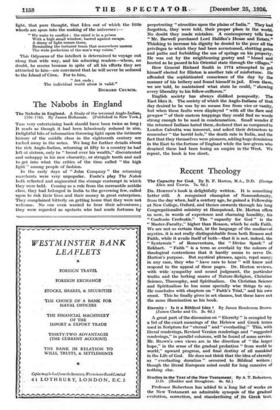The Nabobs in England
The Nabobs in England. A Study of the returned Anglo-Indian, 1760-1785. By James Holtzman. (Published in New York.)
This very entertaining book should have been twice as long I It reads as though it had been laboriously reduced in size. Delightful bits of information throwing light upon the intimate history of the middle class in the eighteenth century are tucked away in the notes. We long for further details about the rich Anglo-Indian, returning at fifty to a country he had left at sixteen, only to " brood over his wealth," discontented and unhappy in his new obscurity, or struggle tooth and nail to get into what the critics of the time called " the high light " among people of fashion.
In the early days of " John Company " the returning merchants were very unpopular. Foote's play The Nabob _both reflected and augmented the strange contempt in which they were held. Coming as a rule from the mercantile middle class, they had belonged in India to the governing few, called upon to risk their lives and their money in great enterprises. They complained bitterly on getting home that they were not welcome. No one even wanted to hear their adventures ; they were regarded as upstarts who had made fortunes by perpetrating " atrocities upon the plains of India." They had forgotten, they were told, their proper place in the world. No doubt they made mistakes. A contemporary tells how " Mr. Harwell purchased Lord Halifax's House and Estate." Thinking to increase his dignity he denied to the poor all the privileges to which they had been accustomed, shutting gates and paths and forbidding the use of springs on his property. He was cut by the neighbouring gentry and " hissed and hooted as he passed in his Oriental state through the villages."
How General Richard Smith in 1774 attempted to get himself elected for Hinton is another tale of misfortune. He offended the sophisticated conscience of the day by the manner of his bribery and found himself in jail. Even there, we are told, he maintained what state he could, " showing every liberality to his fellow-sufferers."
English society has always disliked pomposity. The East likes it. The society of which the Anglo-Indians of that day desired to be was by no means free from vice or vanity, but when these faults were displayed "with all the flare and gewgaw " of their eastern trappings they could find no words strong enough to be used in condemnation. Small wonder if the returned Indians hated them, declared that as compared to London Calcutta was innocent, and asked their detractors to remember " the horrid hole," the death rate in India, and the
fact that they themselves were pioneers, adding huge dominions in the East to the fortune of England while the law-givers who despised them had been losing an empire in' the West. We repeat, the book is too short.


































 Previous page
Previous page